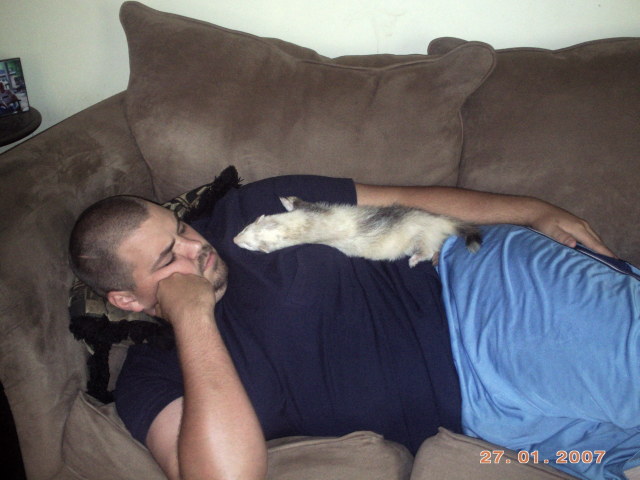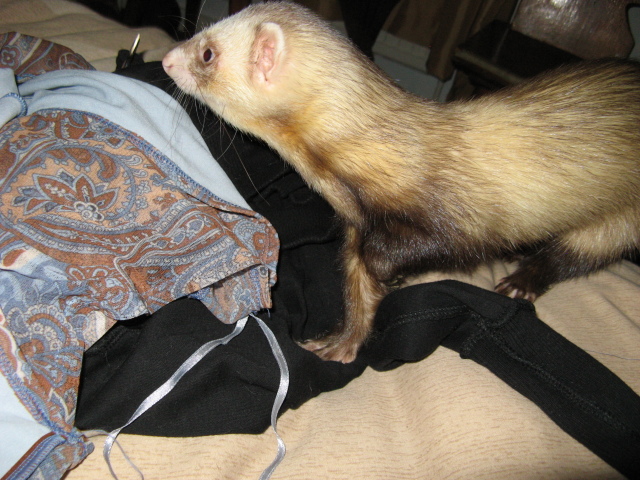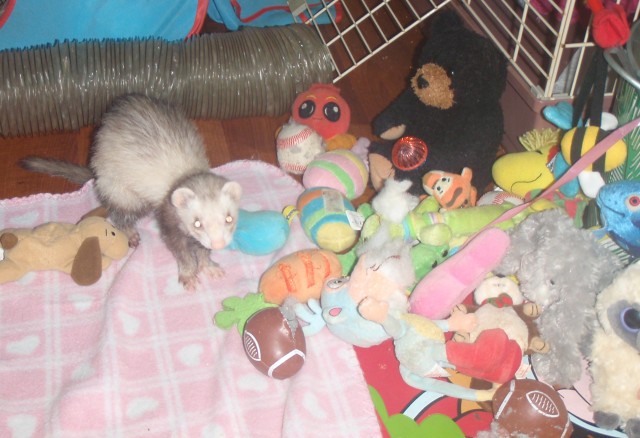QuestionI adopted my two ferrets together almost three years ago together. The older one, 5-6 yr male, has never been quite as active as the younger one, 4-5 yr female; instead of playing for the most part he would just run around when he was out of his cage then find somewhere to hide and sleep for hours on end. He was also a bit fat for a while, but seemed very healthy otherwise. A few weeks ago I noticed him coughing and he was starting to get a little thin. I gave him a little lax for his throat and it seemed to help, I haven't heard him cough in a while. But he continued to get thinner despite the fact that I would see him eating regularly and within the last couple of days he has started vomiting... a lot. Multiple times a day. He's still just as happy to run about when I let him out of his cage and doesn't seem to have lost much of what little energy he had, though he does seem to zone out every now and then and is now losing hair on his tail. I've browsed through several forums on ferret sickness and haven't found anything quite like what he's going through, so I'm not sure what to do, and vets are so spendy. Anything will help, I'm extremely concerned for him. Thank you.
AnswerHello Michelle,
My apologies for taking a bit to respond. It has been a hectic weekend for me.
The there are two conditions that come to mind, Insulinoma and Adrenal disease. It is possible that your ferret has developed both, although the two are unrelated. The symptoms that point to each are fur loss on the tail area (a major symptom of adrenal) and "zoning out" which is very typical of insulinoma. It is also possible that these symptoms are due to another problem entirely, but since adrenal disease and insulinoma are very common, you should be aware of them as a possibility.
Here is some info on each:
Adrenal disease (hyperadrenalcorticism):
Causes: Adrenal disease is caused by tumorous growths on one or both adrenal glands, which lie above each kidney. It causes an overabundance of hormones production, such as estrogen (even in male ferrets) which is the major reason for the hair loss. Testosterone is also produced, which can lead to increased aggression in males. No one is certain what triggers adrenal disease, but some speculate that it is the overabundance of artificial light, early spay/neutering, diet, or genetics.
It is thought that the early spaying/neutering is a MAJOR cause since it is rarely seen in countries such as the UK which do not practice altering at a young age. It is unfortunate that most ferrets purchase in the USA have been fixed at an extremely young age, which puts them at a highly increased risk of the disease later in life.
Symptoms: One of the major symptoms is hair loss or thinning that begins on the tail and/or back and works its way up toward the shoulders. This is a classic manifestation of the disease, and it seen in most cases. Some other symptoms include swelling of the vulva (female false heat), thinning of the skin, a dry or brittle pelt, aggression (in males), weight loss and sometimes lethargy. Not every case of adrenal disease will present with all of the above symptoms.
Treatment: Adrenal disease is 100% fatal IF untreated. The best method is surgery to remove the affected gland(s) or injections of a drug called lupron. Medications (Lysodren, Lupron, melotion injections, etc) that can help slow the progression of the disease and promote fur growth. Medication will NOT stop the condition, but it will allow a longer more comfortable life. Adrenal disease is VERY painful and if left untreated. You will need to consult a vet to discuss your options if your ferret is diagnosed.
NOTE: Ferrets with bilaterial or a tumor ONLY in their right adrenal gland have more complications with surgery since not as much gland can be removed due to the proximity of the descending vena cava.
Additional Information:
http://www.ferretcentral.org/faq/med/adrenal.html
http://www.ferret-universe.com/health/adrenal.asp
http://www.cypresskeep.com/Ferretfiles/Adrenal.htm
Insulinoma:
Insulinoma occurs when tumors on the pancreas produce too much insulin. Essentially it leeches most of the glucose (sugar) out of the blood and is the opposite of diabetes. It is a common problem of older ferrets, especially ones that are fed sugary treats. If she has an episode of "zoning out", try giving Karo-syrup to her by rubbing a bit on her mouth or gums. It will help bring her blood sugar levels up and "snap herout of it". Do not offer it at any other time.
Insulinoma is is often difficult to diagnose since the symptoms of "zoning out" come and go. It also has a wide variety of other symptoms as well. Some of these include:
weight loss
decreased appetite
weakness/lethargy
salivation or pawing at the mouth
a trance-like state or "staring off into space" or glazed look
seizures
Insulinomic episodes can occur sporadically and without warning. Often they become increasingly more frequent as time passes. It is a progressive disease and can only be treated though surgery. 50-70% of the pancreas can be safely removed, and the earlier this is done, the better the prognosis. One of the major problems is that the nodules on the pancreas often return after the surgical procedure, although this is not true in every case.
Information on Insulinoma:
http://www.ferret-universe.com/health/insulinoma.asp
http://www.ferretcentral.org/faq/med/insulin.html
http://www.lbah.com/ferrets/insulinoma.htm
It is thought that feeding too many sugary treats to the ferret may be a major cause of the disease. Make sure you feed only a high quality diet and NO fruit, vegetables, carbohydrates or ANY sugary food. Please see the link below for a guide to proper ferret diet and nutrition. ONLY give karo-syrup or honey if he is having a hypoglycemic episode, and bring him to your vet ASAP.
http://en.allexperts.com/q/Ferrets-2277/2010/7/Ferret-21.htm
The most important thing is to bring your ferret to your vet for a full physical exam and blood-work to rule out the possible causes including insulinoma and adrenal disease for your ferret. A 4-5 year old is middle aged-elderly in the ferret world. Lethargy and vomiting are VERY common symptoms to any number of medical conditions. Since they are nonspecific they can be due to anything. You needs to have her see a vet to rule out adrenal disease as the cause of the fur loss and insulinoma for the episodes of "zoning out". Also, vomiting can cause severe dehydration, so please have her seen sooner than later.
If she exhibits other symptoms (such as seizures or anorexia) or becomes more lethargic, bring him to your vet ASAP. I hope this answer has been of some use, but only a veterinarian can diagnose and treat what is really going on.
-Cindy P

 Crazy Ferret
Question
Tweedle and Drew
My son brought home a ferret
Crazy Ferret
Question
Tweedle and Drew
My son brought home a ferret
 I think my ferret is to thin?
Question
Photo of Ferret
Hi
I think my ferret is to th
I think my ferret is to thin?
Question
Photo of Ferret
Hi
I think my ferret is to th
 My 7 yr old ferret is obsessively chewing her toys
Question
Cecilia and her babies
Hi,
My ferret Ce
My 7 yr old ferret is obsessively chewing her toys
Question
Cecilia and her babies
Hi,
My ferret Ce
 My ferrets die
Question
Mia
My ferret die lest nite she was ten
My ferrets die
Question
Mia
My ferret die lest nite she was ten
 Poisonous outdoor plants.
QuestionHi, Cindy. I had a question thats been spinning
Poisonous outdoor plants.
QuestionHi, Cindy. I had a question thats been spinning